#alignment game
Explore tagged Tumblr posts
Text
The Evolution of RPGs: Nine Men's Morris
I wasn't sure how to try to fit the "alignment" subgenre into my evolutionary tree. These are games like Tic-Tac-Toe or Nine Men's Morris, and I find it very compelling to suggest that they were actually the first pure strategy games, largely because they're so simple (even average humans can completely solve the smaller ones). It stands to reason that they'd be an early prototype that then evolved into something like Petteia (in the same way that Senet may have evolved from Mehen) as players demanded something more complex. Also, alignment games are another essential human genre, with examples from disparate and disconnected cultures around the world. Unfortunately, the archaeological evidence doesn't cooperate. It's true that there are some surfaces as old as 1400 BCE that have alignment game scratches in them – but why should graffiti scratches be just as old as the surface they're scratched into? As it stands, records that attest to the play of these games don't appear until over a thousand years later, which suggests the earliest alignment games were created long after Petteia and Go. I wasn't able to dig up a satisfying answer on this one, so you know anything more about it, please send me a message!



Click here for the index of my Evolution of RPGs posts.
#part 5.5#tabletop#history#evolution of rpgs#nine men's morris#morris#fangqi#alignment game#game design
6 notes
·
View notes
Text
alright friends. you have to rename yourself using the NATO phonetic alphabet. which one are you choosing?

#I have a feeling which is going to be the LEAST popular but I am curious which ones folks would pick#extra fun because some of them are mainstream names to begin with. and some of them are golf#poll#polls#tag yourself#name#names#alignment meme#alignment chart#tag meme#reblog meme#original#sillyposting#silly#tag game
8K notes
·
View notes
Text



trapped in amber
#illustration#digital art#original art#artists on tumblr#character art#marcia#marciaillust#marcia continuing her mission to shit colour maximalist style#i am really enjoying making this garret centric series of paintings#and its been fun seeing the reaction of people to the previous one! many kind words and some people even included their interpretation#of what it means about the characters#i remember one was very sweet... very much the opposite of what I meant to say with the picture but you know what#a knee jerk reaction to interpret things with love at the helm - what a glass-half-full kinda worldview. what a wonderful trait#as an author is talking about the meaning allowed or is it giving the game away#i think i should stay dead. even if i create these with a very specific message at the core#all i can do is create the artefact and try to align and point its elements in a specific direction but what the audience does with it#is outside of my control. to try and control the perception of an artwork speaks to its weakness in its ability to communicate#not to mention the insecurity of the author#i think art is the relationship created between the artefact and the audience member. whatever shape it takes#and to try and forcefully mould it is sacrilege frankly#even if (arthur clenching fist dot jpg) even if sometimes some people are misguided.#orion lavont#garret#tcm#oc#the clockmaster#GOLDEN CALF!!!!! BEHOLD AND OBSSES!! OBSERVE AND POSSES!!!!!! HOLY AND WITHOUT A SOUL!!!!!!!!!!!!!!!!!!!!!!!!!!!!!!!!!!!!!!!!
2K notes
·
View notes
Text
Creating a soulslike where all of the endings are turbo-horny in wildly incompatible ways and watching the fandom argue about which one is the "good ending".
#gaming#video games#game design#tropes#soulslikes#specifically baiting the d&d alignment nerds by making playing lawful good lock you into the vore ending
10K notes
·
View notes
Text
Dissociated and we got a whole canvas of my fav

#priceghost#ghostprice#im having a soul crushing gastric rn prob from stress so i laid down and drew to take a break#i still got it#i think#Ghost will always be my comfort guy to doodle#my blorbo.....#as you can tell i found a brush i like!! that is similar to my krita brush :))))))) im so happy about it#if the vibes are true and the stars align and our prediction game is right...the questions tomorrow MIGHT repeat from our seniors#praying...hoping...#though I do not recommend predicting questions#I still studied every other topics just to be on the safe side#my simon riley is great at giving massages#and he likes a guy who can beat him up (price)#is anybody gonna match his freak#u know that one audio where a guy went “I need a woman who can kill me” yeah that is simon riley LOL#anyways#i'll survive i think#gummmyart#doodle#simon ghost riley#captain john price
1K notes
·
View notes
Text









Just did a restock of my Hatching Chao Egg Charms! Listened to feedback as well and have adjusted the eggshells! ^^ These little guys are ready to hatch again and again! Each charm has little magnets inside to help them snap into place with little effort. They're also strong so they won't come out unless you want them to. Perfect for any Sonic fan and Chao fan alike! More chao designs are also planned in the works!
Available on Etsy!

#my baby hands made this#etsy#etsy store#etsyshop#small artist#sonic the hedgehog#sth#shadow the hedgehog#NIGHTS into dreams#chao#chao garden#sa2#sa1#sonic adventure#sonic adventure 2#sonic adventure 2 battle#acrylic charms#fidget#cute#egg#hatch#neutral#dark#hero#alignment#video games#sonic x shadow#sonic x shadow generations#chao tales#sonic movie 3
573 notes
·
View notes
Text

#slay the princess#I know this is out of nowhere but-#Sorry someone just sent me a crazy take and this is the only way to cope.#Reminder! The devs themselves said that they see all endings as canon!#Do not send authors messages if their fic/interpretation/posts did not align with your canon!#Fun fact! I only became interested in this game *because* the devs said that#So people saying that that interpretation is wrong… kind of rub me the wring way.#So just to confirm:#Saying you interpreted the game's relationship as romantic and healthy: Cool#Saying anyone who interprets the game any other way is wrong: Not Cool#meme
2K notes
·
View notes
Text


















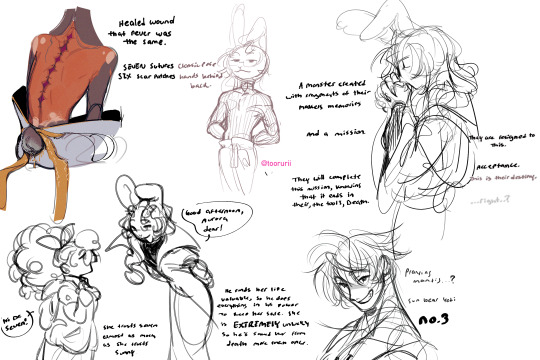
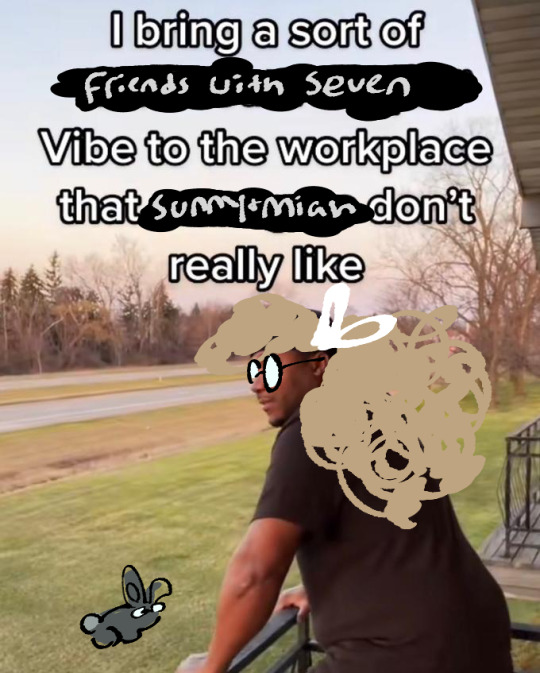







Absolutely GINORMOUS art dump of sketches and sneak peeks I don't think will see the light of day ever / any time soon.. Tried my best to sort them by relevance to each other! Please look at the inner workings of my mind over the past at least 12 months
#There is no romance between ty and six. she is like a pretty little goldfish to him#2024#2025#sketch#scheduled post sorry if our fates are aligned#okay. I'll tag them. (coughting up blood)#Platina#Tamako#Sunny#Dizzy#Hei#Agape#don’t laugh at these next tags yall#One#Three#Ise#Six#Seven#Typhoeus#literally all I think about is seven. I think he would thrive in a nier game#fucked up furball that's doing something absolutely cruel to a greater power-#For the good of mortals who are at the angels/demons will#I love making ocs with split factions where you can see reason on both sides#aka mortals vs angels/demons#Aurora#Viola#jeremiah#Mateo#Vladimir#Rosette
548 notes
·
View notes
Text
the naming of hunger games characters is absolutely masterful. each one could have a whole page written about it, and tho i can't say anything that hasn't already been pointed out a million times, i do want to highlight one generality. most of the names in the districts are one of two things: common words (altered or not) to become names, often in line with their district's culture (Gloss, Thresh), or phonetic shifts of contemporary common names (peeta being derived from peter). this suggests, without changing how the characters speak, the idea of linguistic evolution, which in turn is representative of change and of local cultural. the districts are a people in dialogue and evolution with one another. and now compare this with the names of those in the capitol. off the top of my head i think of Plutarch, Coriolanus, Flavius, fucking Caesar. these are, one, roman names, which further serves to reinforce the comparison between the capitol and rome and all that entails, but these roman names, names that have been etched in stone and unchanged for millennia, are a stark contrast with the alive and dynamic names of the districts. it's just another (not so) subtle way that collins reminds us of the differences and the values of the capitol versus the districts.
#people from more capitol aligned districts will have more roman names like Cato#it's a great way to make connections in the readers mind even if they aren't aware that is whats happening#and it's more subtle than the makeup and aesthetic codes#the hunger games#linguistics
8K notes
·
View notes
Text
I'VE GOT MY EYES ON YOU

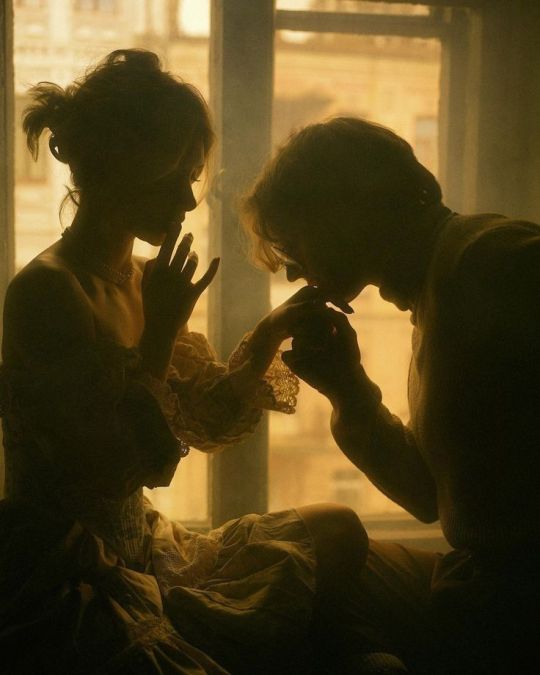

Finnick Odair x fem!reader
Summary: Just the pov of Finnick loving you over the years, and remembering everything about you
Warnings: cute but with a bit of angst on Finn's part. Other than that, all happiness and love.
a/n: Well, excuse any spelling mistakes, English isn't my first language. And I tried my best to make it as much like Finnick as I could, but this is my first fic of his lol. Anyway, I hope you like it and enjoy <3
Words: 1.8k

Finnick remembers the first time he saw you. He was eight and you were only six. Your father had gone to see his for some reason Finnick can't remember — not least because he hadn't been paying attention to them. What he does remember is you glaring at him. It made him laugh, which only deepened your frown.
He imagines it was because you didn't like him very much at the time. He didn’t blame you. With your older brother constantly saying that no boy was any good, it was hard to be friends with anyone he was always badmouthing. Finnick didn’t blame your brother either — in a world like theirs, any protection, even unnecessary, was better than none. Still, nothing changed how cute and funny he had found you at the time. After that day, you never met in person again.
The time he considers the second was when his name was called at the reaping. He remembers your eyes glued to him; you were twelve, and he was fourteen. He could feel your pity seeping through his skin. He didn’t blame you — after all, like it or not, it was still the Hunger Games. But knowing that you were looking at him made it almost funny to him, and it was with that thought in mind that he entered the arena.
The third time was when he returned home victorious. Of course, there were lots of people congratulating him — his relieved family and everyone else — but the only thing he saw was you, walking toward him. He didn't think it was of his own volition, considering you was with your father and brother, but as soon as you approached, you wore the best, most beautiful smile he had ever seen you give. And for the first time in years, you spoke to him.
"Congratulations on winning, Finnick. I'm glad you're back... well, we're glad."
He could see the smile on your father’s face, though he couldn’t say the same for your brother. Not that he minded. So he just smiled back at you — not the smile he reserved for the Capitol, but a real smile.
"Thank you. I'm glad to see you too."
He saw you get embarrassed, and he wanted to laugh at that. But he wouldn’t — not in front of your father. Not yet.
For the rest of the day, he listened to his father talk about how much your father complained about you, because you wouldn't stop talking about Finnick. His father laughed as he ruffled his hair affectionately. And it’s not like Finnick was going to complain.
Everyone said it was normal for girls to have a little crush on boys who won at something — at least, that’s what the people he knew told him. Maybe that’s why, two months later, it was as if Finnick no longer existed to you. You were back in your own world, with your friends, without him. Not that it bothered him — not really.
The next time he really saw you, you were sixteen, and he was eighteen. He was a mentor now, and when your name was called at the reaping, he could see on your face how much you hated it. Most people didn't care or thought that a dead kid from District 4 wouldn't make much difference, since you wasn’t a Career or someone important. Finnick hated it — but he would never say so.
He also remembers how, for whatever reason, you didn't put any effort into your training. He thought it was because of what everyone thought of you as a tribute, or maybe you just didn't give a damn about dying in the arena. He didn't admit it at the time, but he had been terrified that you wouldn't make it out of the arena alive. He also remembers how surprised everyone was by your training score — including him. It was a ten. He remembers it clearly, and you didn't seem to mind.
On the day of the Games, all you did was say goodbye to your stylists. You didn't look in anyone else's direction, but he didn't blame you. If you were going to become one of the last survivors, there would come a point when you would have to kill someone. It wasn't something everyone wanted to face.
He remembers seeing you in the arena — you did well. For the first few days, you kept to yourself, hiding and trying to survive. But at some point — he can't say exactly when — things changed. Perhaps it was when the male tribute from your district was killed, or when you saw a pair of boys, just twelve years old, die.
It wasn't a change that anyone on Capitol had noticed. But Finnick knew you well enough to say that the deaths of people you barely knew had affected you. He still remembers when one of the tributes from District 4 was a twelve-year-old boy - you didn't know him, but you still went to say goodbye. You were only fourteen.
And at that very moment, you had just thrown an axe into the head of the boy from District 3 who had killed the twelve-year-olds. You hadn't thought — you had just acted. Obviously, this had a positive consequence for you in the Capitol's eyes, because a while later, you were sent food that would last for about four days.
He remembers the exact moment you won. He wanted to say he was relieved, but that wouldn't be fair to you. Until you left for District 4, you didn't say a single word to him. Perhaps because no one was looking at you with such high expectations anymore, you felt confident enough to speak.
"Do you regret killing those people to survive?"
"No."
He had to be honest; he couldn't lie. But after that, he didn't hear your voice again for the rest of the journey — you didn't even look at him. Still, when you arrived in District 4, you acted as if you were fine, as if you didn’t care.
He also remembers when you became friends. It was a good thing — a big step, considering that before, you wouldn’t even look him in the face. Now he understood why. Even though it hadn't seemed like it before, you had lots of friends. You were funny, entertaining, and you cooked extremely well. Finnick admitted that he envied your food — and he couldn’t lie about that.
He obviously remembers the following year, when the two of you were mentors. You were only seventeen, but you didn't seem bothered about directing two people toward a possible death. He saw how hard you worked not to get attached to either of the tributes, because if they didn't come back, you wouldn't feel guilty. But when Annie returned, alive and safe, he also saw you break down. You hugged her as if she were going to disappear. And he didn’t blame you for that either. Over the next year, no one ever brought up the subject of Annie becoming a mentor.
When you were nineteen, things went to another level. Once ignored, now he was kissed when no one was watching — well, that was a breakthrough. He remembers every kiss, every smile. He also remembers when you woke him up at dawn to help Annie. He didn't mind; he was spending time with you and helping a friend.
While he was making tea, if he looked over his shoulder, he could see you hugging her, whispering what sounded like a lullaby — the kind you sing to babies when they can't stop crying. He could see how much you loved and cared for Annie, and that always made him fall in love with you a little more, even if he didn’t know it at the time.
He certainly remembers the time he told you he loved you. You had just turned twenty-one. You said it back. And you held each other for the rest of the night.
He also remembers the 74th Hunger Games. He saw your relief when those two young people, madly in love — though he didn't believe in that farce — survived together. You didn’t know them, but you were obviously happy for them.
He also — sadly — remembers the Quarter Quell. When his name was called, he had imagined it would happen. But that day, once again, he saw you. Annie had been called, and before Mags could volunteer, you did. He saw you hugging Annie, comforting her as he heard her whisper "sorry," but you just smiled at her. And as you hugged, he heard you say:
"I'm sorry, but I couldn't let that happen to her again."
"I know..."
He didn’t know. No — actually, he did. He just didn’t want to admit it, because admitting it meant facing the reality that this year, he’d be going into the arena with you. And he didn’t even want to think about that.
In the arena, he did everything he could to protect you, Katniss, and Peeta. He really wanted the plan to work. He believed that you would be fine if they separated. But when he woke up, you weren’t there with him. You were in the Capitol with the others. For the first time in years, he wished he had died in that arena when he was fourteen.
He felt it the moment he got you back — you weren’t really there. He spoke to you, but you didn’t listen. And if he tried to touch you, he saw you despair, screaming as if he had hurt you. And he felt that way — he felt guilty for letting the Capitol lay even a single finger on you. They told him to take it easy. He wanted to tell everyone to fuck off, but when he looked at you, he knew they were right.
At that very moment, he was keeping you company, obviously giving you space — he didn’t want you to get hurt. But when he heard you calling him, he admitted he was desperate; you hadn’t even looked him in the face for days. So probably, if you had asked him to get down on his knees and beg for forgiveness, he would have — even if he didn’t need to. But he held back.
"Finnick?"
"Yes, dear? Do you need anything?"
"I'm sorry..." It came out as a whisper.
"Hey, hey, what are you apologizing for? You have nothing to apologize for."
"I..." You didn’t manage to finish before tears welled up in your eyes.
"Hey, hey, please don’t cry..." He tried his best to comfort you without having to touch you. But before he could decide what to do, you hugged him — a little hesitantly, but you hugged him. And at that moment, he collapsed. He shouldn’t have cried — not when you were in such a fragile moment — but he couldn’t help it.
For a moment in his life, he had thought he had lost you, that he would never see you again. And at that moment, he decided he would never let go of you — not with the possibility of losing you again. He would never let that happen. He would always see you now.

#finnick x reader#finnick odair x reader#finnick odair#finnick odair x you#thg finnick#finnick odair fanfic#hunger games finnick#finnick odair fluff#finnick odair imagine#finnick fanfic#the hunger games#hunger games#annie cresta#annie cresta x reader#katniss everdeen#peeta mellark#katniss and peeta#thg#fanfiction writer#thg fanfiction#mockingjay#catching fire#vertical-align: inherit;#<font style=><font style=>jogos vorazes finnick </font></font>
505 notes
·
View notes
Text


At your side [End of Season 2]
[First] Prev <–-> Next
#poorly drawn mdzs#mdzs#wei wuxian#lan wangji#wen ning#jin ling#wen qing#jiang yanli#a-yuan#It may have taken a year but we did it! The end of season 2!!!#(Granted: this season was nearly twice the length of season one.)#It's been a really fantastic season to draw for. So many iconic moments! It was a lot of work but I had a blast B*)#I also enjoyed experimenting more and more with my comic style. I'm growing as a comic artist bit by bit!#There is even a little bit of shadowing in this one for next season. As a treat. All the fun (and not heart breaking) scenes to come!#Comic talk time: Recently saw 12 angry men for first time and I love the coincidence of the themes aligning here.#They both touch upon the horror of judicial systems - in which the most persuasive argument wins and the truth is a nuisance.#All it takes is one person to stand against the crowd and say 'I do not know what is true. And that is reasonable doubt enough.'#When the majority is for condemning someone guilty - that in itself is persuasive enough.#One will set their mind to what the 'truth' is and refuse to see it any other way. That their perspective is the only correct one.#No one is born with a monopoly on the truth.#Everyone has biases and agendas. Some care not for the outcome - only that they can be on the convenient side.#Lan Wangji is putting everything on the line to say 'I'm not going to go with the majority vote.'#And that is a huge deal in a story that is so politically focused as MDZS is. Everything is a careful chess move to these sects -#and to not play the game is basically sacrificing everything you are and your families name. For some it is unthinkable.#And there is no doubt in LWJ's mind. He would stand there and lose everything if it means upholding justice.#More importantly - these two have each other's backs. The bond is unbreakable. This is the most ride or die I have seen two people be.
2K notes
·
View notes
Text

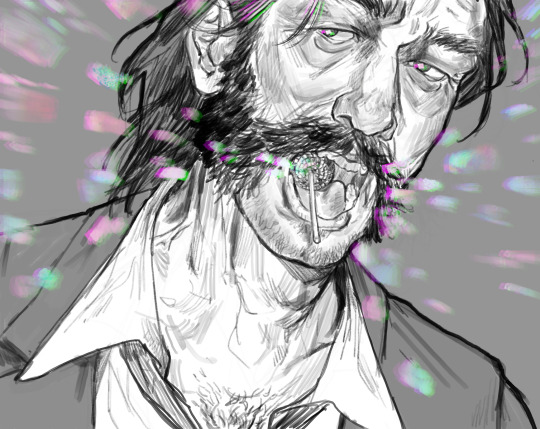
disco!
#disco elysium#kim kitsuragi#harry du bois#my art#iskoart#some planets must have aligned bc these paintings came out PERFECTLY#who wants to be the kim to my harry#bu adam aynı ben#GODDD THIS GAME. I HAVE NO OTHER WORDS#kimharry
1K notes
·
View notes
Text
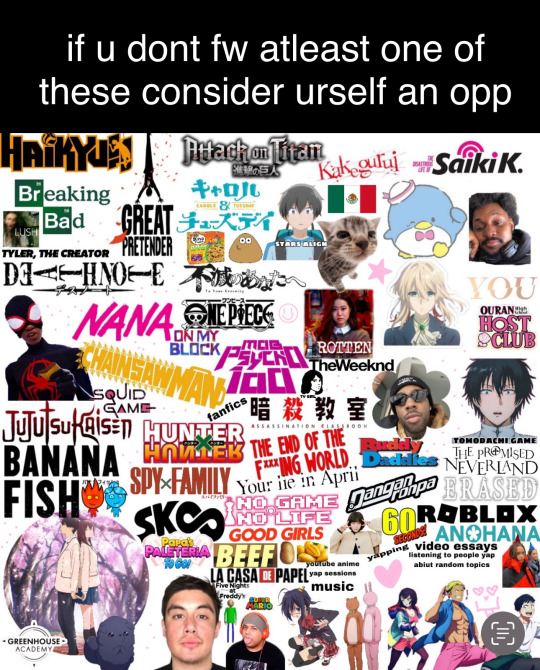
if u do like any of these pls friend me (im desperate)
🫶🫶����
(sry for so many tags)
#coryxkenshin#anime#haikyuu#death note#csm#mob psycho 100#miles morales#one piece#nana anime#rotten mango#sk8 the infinity#stars align#pou game#brent faiyaz#buddy daddies#fanart#fanfic#spy x family#chainsaw man#attack on titan#jujutsu kaisen#i want to eat your pancreas#kubz scouts#hunter x hunter#great pretender#violet evergarden#joe goldberg#banana fish#the weeknd#tv girl
1K notes
·
View notes
Text
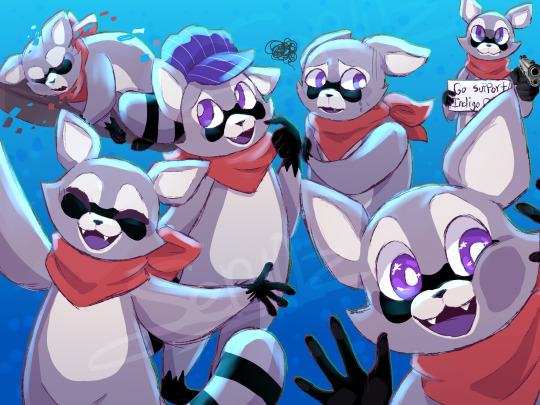
GO SUPPORT THE INDIGO PARK KICKSTARTER !!
#serv0z art#indigo park#rambley the raccoon#rambley raccoon#mascot horror#indie game#art#fan art#indigo park rambley#ive been waiting for this game for like a year now#its so nice to see a mascot horror game where the creator actually gives a shit and puts effort into it#ALSO IM LEARNING HOW TO DRAW ANIMALS THANKS TO THIS AND COTL ARE YOU PROUD OF ME??#its like my interests aligned up perfectly#i still have bsd art and animations to work on but i might work on my narilamb-esc cotl animation first soon#i havent drawn in 2 weeks this is the first thing i do when i come back (minus the lamb and narinder refs that i am Not posting rn)
2K notes
·
View notes
Text
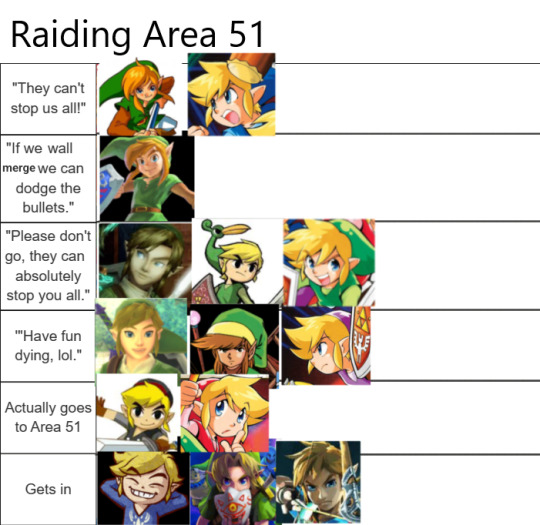
Found this in my files lol. Sort of a sequel to this, now including the four swords links and botw
#loz#legend of zelda#link#meme#alignment chart#alignment chart meme#four swords#red#green#vio#blue#Oracle games#alttp#minish cap#wind waker#majoras mask#oot#skyward sword#loz 1#adventure of link#albw#a link between worlds#ocarina of time#spirit tracks#botw#breath of the wild#funny#the legend of zelda#twilight princess#oracle of seasons
538 notes
·
View notes
Text
"The Lion Has Its Own Historian:" Parallels Between Gorgo and Aglaea
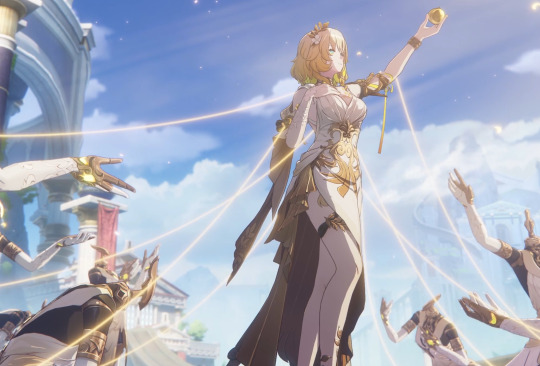
While re-reading Mydei's "As I've Written" stories recently, I was intrigued again by the (seemingly impossible) section in which Aglaea unknowingly echoed Gorgo's words to Mydei, and this led me down a rabbit hole of thought: The roles of Aglaea and Gorgo--not only in Mydei's life but also in the story overall--form some interesting parallels that are worth looking at in closer detail.
Seize the Means of Control
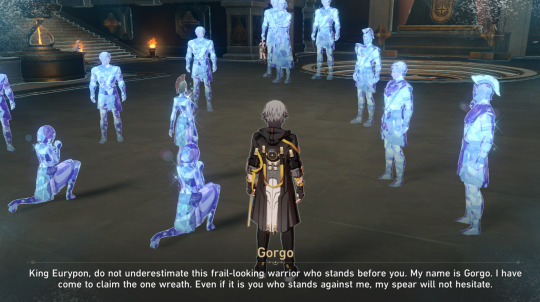
Gorgo's ascension to a position of authority was predicated on power--not only on her martial prowess, which was expected in her culture (i.e. slaying a lion with her bare hands), but through her courage to meet the existing symbol of authority, Eurypon, in single combat and not concede. In Kremnos, status is conferred and maintained through violence. Though on the surface Gorgo defies this belief, she ultimately remains an active participant in Kremnos's tradition of "might makes right" through the Kremnos Festival, reinforcing rather than rejecting her culture's military-centric social structure.
Although Gorgo originally took part in the Kremnos Festival with the intention of beating Eurypon and seizing the throne of Kremnos for herself (presumably because she thought she could rule better), she ultimately chooses to accept his continued leadership and become queen instead, even granting him an heir to cement his legacy. In this way, despite presumably wishing for a less wasteful (of life) philosophy for the Kremnoans, Gorgo becomes one of the foremost beneficiaries of the very mindset she opposes. She clearly wants to reduce the meaningless bloodshed in Kremnos--she strongly rejects the notion of patricide, for example--but she doesn't (at this point) reject the overall structures of the Kremnoan culture, including the belief that combat ability should determine who leads.
In short, her position of authority was achieved strictly through her ability to oppose her foes.

Despite coming from a wholly different culture, one which (ostensibly) values debate, diplomacy, and the rule of law as the primary tools for establishing status, Aglaea's rise to power was remarkably similar to Gorgo's. The game confirms that the prominence and influence of the Chrysos Heirs in Okhema is no lucky accident--instead, Aglaea has clawed her way to the top, fighting tooth and nail to establish herself as a figure of authority in the Holy City.
We're told she exerts her pressure both through economic means, amassing wealth via monopoly on resources such as Amphoreus's internet, and through literal bloodshed.

The story dances around it, but Star Rail's marketing embraces it: Aglaea represents not just the joy of love but also the "deadliness" of romance, the figure of power in Okhema "pulling the strings" and making others dance to the tune of her vision for the future. She basically rules the roost in the Holy City in large part because of her capacity for violence, because of the literal physical and political power she wields as a demigoddess and the leader of the strongest group of fighters on their entire planet.
This "silk concealing steel" behavior reflects not just how she approaches any who oppose her--the Trailblazer and Krateros, for example--but also how even the NPCs throughout Amphoreus view her:
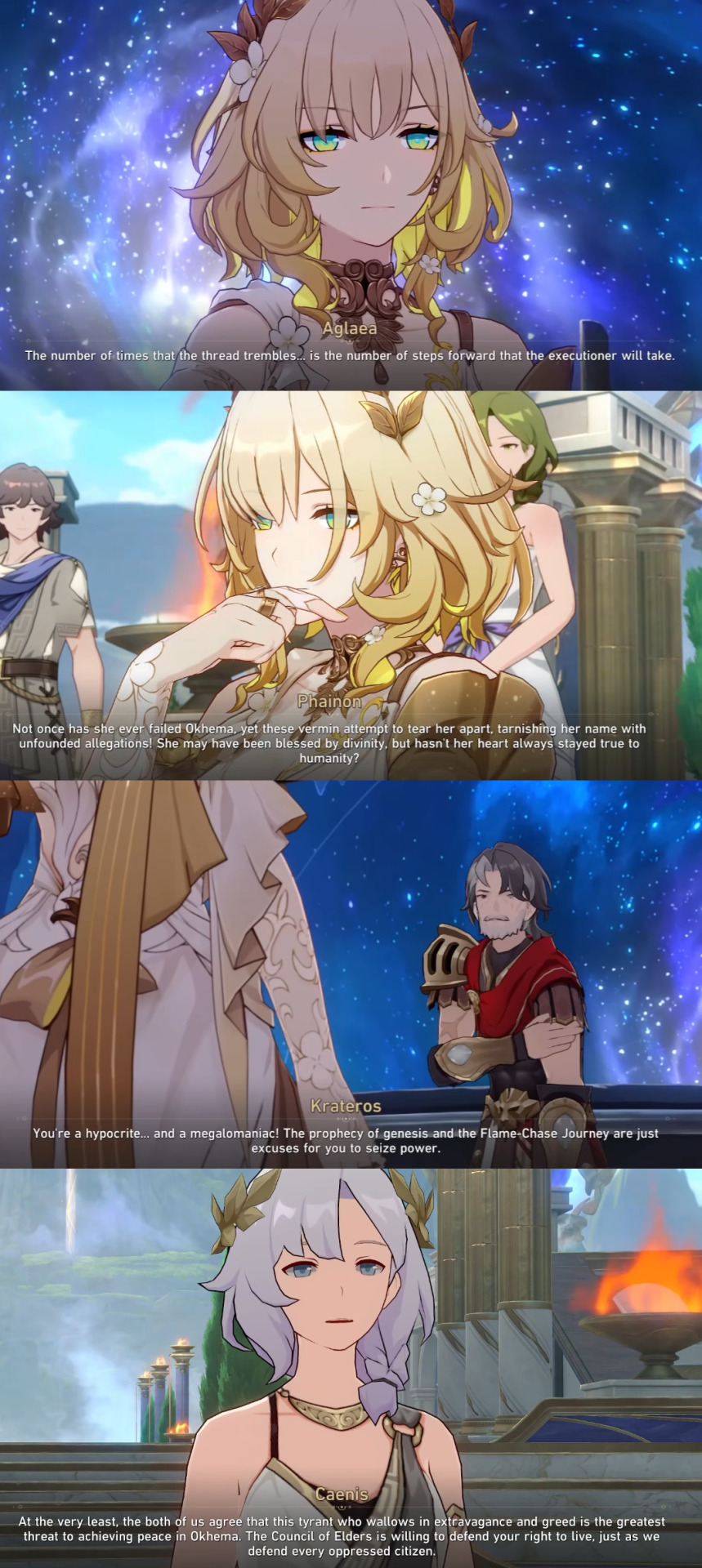
It's particularly Krateros's view of Aglaea which intrigues me, because the very same things he accuses her of are the things Castrum Kremnos is famous for (being warmongers, usurpers of power, etc.). By all rights, he should admire a "queen" such as Aglaea who rules by force and who is leading her people into the greatest war Amphoreus as ever known. And yet he and the rest of the Kremnoans seem to revile Aglaea for the very same things they saw as virtues in Gorgo.
The context is the key: Gorgo seizing power for herself is viewed as honorable and good because it happened in the context of Kremnos, while Aglaea's power struggle and military dominance occur within the so-claimed peaceful structure of Okhema's democratic society, casting her in the role of a "power-hungry tyrant" for the people living in Okhema, even those who should most appreciate her mindset.
Comparing Gorgo and Aglaea in this way highlights a key double standard in the way the Amphoreans react to women who rise to power, and makes it clear how thin the veneer of Okhema's "peace" really is. Stepping to the top rung of the social ladder through the threat of martial retaliation, Aglaea's battle against the Council and the Flame Chase's foes is no different from Gorgo tearing a lion apart with her bare hands, challenging a king, and taking her place at the top of Kremnos's hierarchy by seizing her weapon and making her stand. All that differs is how violence is received in their contrasting cultures, resulting in two diametrically opposed reactions from the "mere mortals" around them.
With Violence as Your Tool
I think it's important to emphasize that Aglaea and Gorgo also parallel each other not just in their rise to authority through physical power itself, but also in their stances on the necessity of that power: Both Aglaea and Gorgo (at least at first) view bloodshed as a necessary evil, an unpleasant facet of life that one must accept in order to achieve a goal. Violence, for both Gorgo and Aglaea, is a tool.
We see this clearly with Gorgo throughout her flashbacks, both in her initial fight with Eurypon (where she claims she would embrace the notion of death only so long as it is not "unnecessary") and in her other confrontations with Eurypon: Gorgo insists that the tradition of regicide must be broken and makes Eurypon promise not to lead Mydei to that path--yet later, she goes so far as to scold Eurypon when he shies away from his fate, essentially calling him a coward for fearing the prophecy that Mydei would one day kill him. "What prince of Kremnos hasn't killed his father?" she taunts, implying that, even as Gorgo fought to change the violent history of Kremnos, she still believed--at least at that moment--that refusing to face violence when it was foreordained made Eurypon a weak and unfit ruler.

However, we ultimately see this stance change. In Mydei's dream of training with his mother, Gorgo reveals that nearly losing Mydei completely changed her perspective on Kremnos's beliefs, finally killing any faith she had in their system of rule and their constant pursuit of Strife for strife's sake. She rejects the notion of combat being the ultimate test of a person's worth, explicitly casts aside her title and role as queen of Kremnos, and embraces a kinder identity as strictly "Mydei's mother." This is a crisis of faith brought on by experiencing the impacts of Kremnos's faith firsthand--by being forced to experience grievous loss, Gorgo is implied to have grown as a person, from one who is willing to accept violence as a tool to get ahead, into one who solely values peace.
These views, too, mirror Aglaea's pursuit of the Flame Chase Journey and her "hidden" feelings toward its necessary loss. We know already that Aglaea views the threat of violence as her go-to "means to an end" when it comes to achieving the Chrysos Heirs' goals.

She is not at all above putting people into harm's way to pursue the prophecy, such as letting Phainon take the Strife trial even knowing that he would fail, and she tells us players over and over again that her own humanity has nearly vanished, claiming that she now no longer has sufficient empathy for humankind to be swayed away from the path of Era Nova.

This is clearly not true (given how deeply she cares for Tribbie, how kind she is to Castorice, and how unwilling she is to actually bring any harm to Anaxa), but Aglaea insists on this emotionless illusion likely because it makes it easier to tolerate the cruelty required to continue pursuing her goal--she needs it to be true that the last of her humanity has already waned, because this is what makes it easier to accept that the Flame Chase Journey is a journey of "loss," one that is fueled by bloodshed.
It is an unfortunate truth of the prophecy that people will die in pursuit of the dream, that capturing all the coreflames and pushing the world forcibly into its next cycle will cost lives and require cold, rational decisions that will crush people's happiness and freedom. Aglaea cannot hesitate, cannot waver, cannot choose kindness over action.
But, like Gorgo, we know that accepting violence as a tool does not mean that the person wielding the tool is always happy to do so. As Gorgo loses her genuine faith in Kremnos's beliefs and begins to view training Mydei for war as nothing more than a rote requirement, devoid of meaning, Aglaea too struggles to uphold her emotionless facade, a protective cocoon whose cracks reveal the enormous weight she is bearing and how deeply the inhumanity of her own decisions wounds her.
We see this clearly in her character stories, where the actions and then later loss of her maid completely reshape her definition of "beauty":
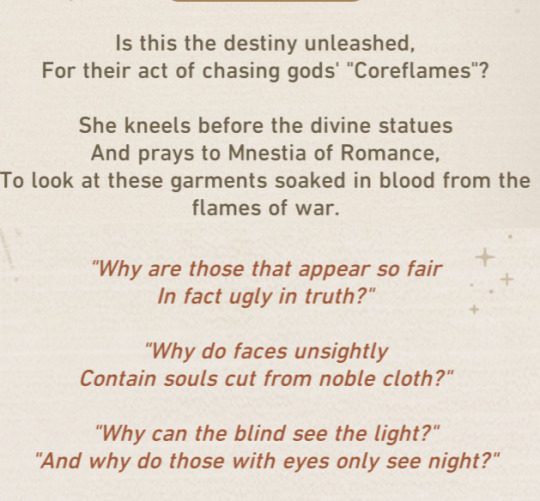
And we also see it very clearly in her behavior toward Anaxa, where she hesitates at the crucial moment, unable to commit to the course of action that she herself set in motion:

Like Gorgo who longs for a softer world where she can simply be Mydei's mother, Aglaea too (no matter how much she claims) has not lost the part of herself that cares not only for the people closest to her but even for the innocents of the world, the boy who wants to bring his sister something beautiful, the girl who shares her bracelet...

Her nature, no matter how much of it has worn away, is at its core humble and kind--reviling the pain of others.
It's this fundamental conflict between love and what must be done that lends both Gorgo and Aglaea their depth as characters, that grants them both an air of nobility, in the way that everyone good who suffers is noble. Being forced to cause harm without a desire to do so creates quintessentially contradictory characters, making the audience privy to both their external mettle and their internal hesitation, easily humanizing both of them. Aglaea and Gorgo are virtuous women whose cruelty is justified for the greater good. Yet in watching both of them struggle under the immense pressure of that cruelty, we recognize the inherent evil of a world that forces kind-hearted people into positions where bloodshed is their only path forward.
Both Aglaea and Gorgo are not women who normally hesitate to seize the tools available to them, or the kind of women who will shy away from wielding their strongest weapon--the threat of death--with impunity. The reaction to female characters who are willing to exert this kind of power over others (including over the men in their lives) both in-game and in the fandom (where Aglaea in particular is treated poorly for her "coldness") demonstrates how unique this particular type of female character still is, and suggests interesting overall power dynamics in Amphoreus that privilege women willing to utilize violence even above men who choose the same route, despite the strong patriarchal bent one might expect of a story with ancient Greece as its primary influence.
Mydei is not the son of Eurypon, but explicitly and always "the son of Gorgo" even in flashbacks where Eurypon is still alive; in Okhema, both the Chrysos Heirs and the Council appear to be primarily directed by women (Caenis occupies the more visible role of Aglaea's opponent than Lygus does), with all of Okhema's demigods (including Cipher) being female. Gorgo's violence is regarded as honorable; Aglaea is met with disapproval from her peace-loving society but no one ever actually dares to stop her. Perhaps Krateros comes closest, by defying Aglaea's will and entering the Strife trial without her permission, but even he ultimately has to be rescued from Aglaea's clutches by Mydei, who explicitly invokes his mother's name to ensure Krateros's safety. Say it with me: The male character with the highest social status in all of Amphoreus has to rely on the power and reputation of his mother to rescue another man from a powerful woman. Amphoreus really said "Ladies first." 💯

Anaxa's reactions to Aglaea are humorous but are also a perfect example of this overall social structure in Amphoreus which assumes strong women in power have an automatic degree of legitimacy because they are willing to seize violence as their means, despite violence being, in real-world cultures at least, stereotypically the domain of men. In 3.1, Anaxa simply accepts it as a given that he will become Aglaea's prisoner and that she will be able to do whatever she wants to him, because nothing in Okhema's social, political, or military structures would enable him to genuinely oppose her (if he even wanted to).

Even in his (sort of) fake-out "siding with the Council" phase, all Anaxa does is move himself from the grasp of one powerful woman to the next, shifting from being Aglaea's prisoner to Caenis's ace. Cerces even has an entire voiceline where she points out word-for-word that Anaxa is functionally just moving from one woman's cage to the next. Caenis in particular seems to view Anaxa as an object, a biting dog she can keep on a leash until she sics him on her enemy. Anaxa obviously is not so easily manipulated, but Caenis's threat about karma eventually comes true, and he nevertheless suffers the final wrath of the Holy City's society, being judged more harshly than anyone else for his seeming unwillingness to submit to the power of either woman in control of Okhema.
Both literally and thematically, the game tells us players that Aglaea and Gorgo are courageous and effective leaders because they live by the blade, because they are willing to harden their hearts and do whatever it takes, whether that means taking another's life--or their own.
To Usher in a New Era
Of course what really distinguishes both Gorgo and Aglaea's willingness to cause harm from malevolent forces in Amphoreus is their ultimate intent. Although both women are willing to do whatever it takes, they do so only in service to a greater purpose, one that they believe will better their world. In this way, Amphoreus's writers reinforce the underlying impression in Amphoreus's plot that women are more trustworthy and reliable leaders than their corresponding male counterparts. Slight side note on this, but it's kind of funny just how consistent this is--even "outside" of Amphoreus, Welt and Sunday had to turn to Herta to save the day, while inside Amphoreus, Trailblazer is still relying on Acheron's advice to get them through. (When you cater to the incels so hard you somehow loop back around into writing staunchly feminist plotlines...)
The message, repeated and unsubtle, is that there is a link between women's leadership and righteousness, with both Gorgo and Aglaea representing an idealistic desire for a better future for Kremnos and Amphoreus as a whole--one by opposing fate and the other by enforcing it.
Both Gorgo and Aglaea face prophecies that promise to reshape the world as they know it, prophecies which require them to make decisions that will ultimately cost them their lives in a desperate bid to influence history toward the best path. Gorgo rejects the prophecy she is given, determined to protect Mydei despite the destruction the omens claim he will bring to Castrum Kremnos.
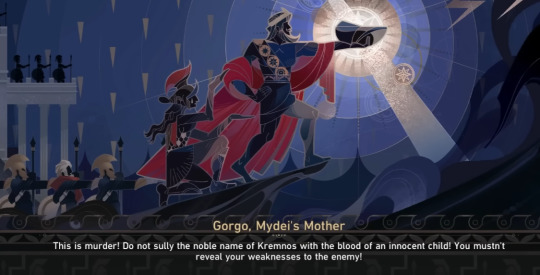
Because of the players' predilections for Mydei, this choice to reject fate paints Gorgo as a heroine, an unselfish and moral person who will choose the life of an innocent child over she own safety. Her willingness to fight to the death to prevent Eurypon's atrocity against their son flies in the face of fate itself, attempting to stop an inevitable, self-fulfilling prophecy.
And, in fact, the game even teases us with the idea: What would Kremnos have been like if Gorgo succeeded? When Mydei returns to Kremnos, he either "envisions" or actually experiences (via timelines bleeding into each other), a seemingly parallel universe where Gorgo succeeded in saving him from the Sea of Souls, and where she clearly rallied the people of Kremnos to her cause. The Kremnos we see in that vision is entirely different from Eurypon's:

The people are happy, rejoicing and at ease, talking about pomegranates and writing and playing games with kids, while the sun paints the whole city in a soft and gleaming gold.
Contrast that with the Kremnos that Trailblazer and Castorice find when they travel back into the past where Eurypon betrayed his wife and left Mydei in the sea:
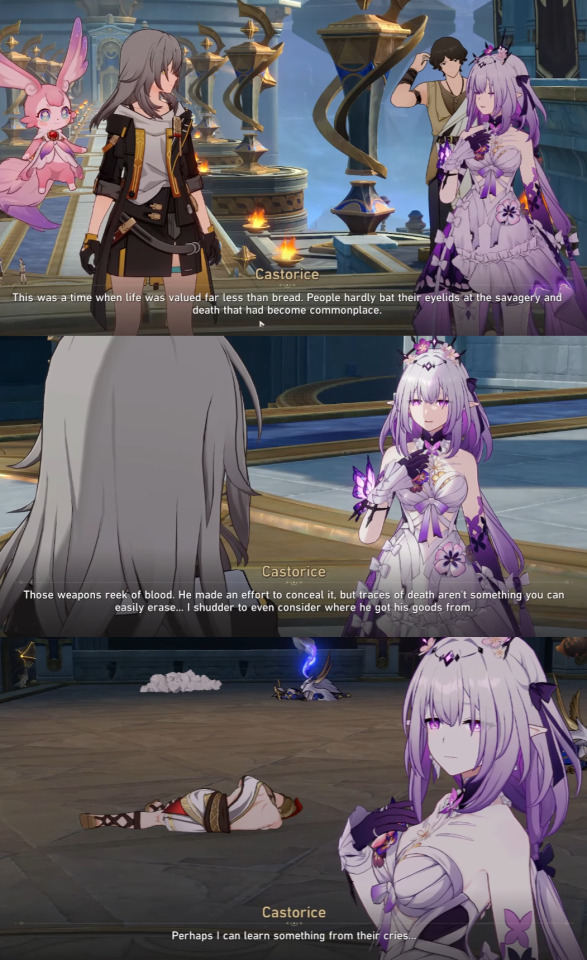
In the seemingly alternate timeline where Gorgo lives long enough to raise Mydei, the Kremnos we're presented with... looks a lot like Okhema. Looks a lot like the peaceful, idyllic Holy City where children frolic in the streets and the people are still full of light and life. By defying fate, we are shown (at least in some fragment of Amphoreus's timeline) that Gorgo achieves what she had longed for in Kremnos from the start, creating a better, gentler future for the people, prosperous and free of the cycle of Strife and meaningless violence that had plagued their kingdom for thousands of years. In this way, we can say that, for that lost timeline at least, Gorgo essentially achieved the Era Nova for Kremnos, ushering in a time of peace for her people. What Aglaea seeks, the game shows us that Gorgo was capable of achieving.
Conversely, Aglaea's path forward involves taking the complete opposite road: Rather than rejecting fate to create a better future, Aglaea seeks to embrace it. She has fully invested herself and her resources in the prophecy of the Flame Chase. She has to, because if there's no Era Nova to look forward to, then there's no hope at all for Amphoreus, and how can it be that something so beautiful is doomed to total destruction? If the Flame Chase Journey will end in a new start, if someone--anyone--will get to live to see the world born anew, then every sacrifice, every burden, every agony will have been worth it.
By embracing her prophesied fate instead of rejecting it, Aglaea is taking the same decisive stand as Gorgo, seizing the future of her world in her own hands and forcing Amphoreus along the path toward what she believes will definitely be a brighter future.
Not only does the description of Era Nova match the idyllic Castrum Kremnos we see under Gorgo's likely rule, but even the moments where both women truly make their stand and reckon with fate reflect each other as well: Gorgo demands her fellow Kremnoans stand with her, hoping they will see the wickedness of Eurypon's decision and reject blind faith in the prophecy they've been given. With her own strength, if even just Krateros alone had stood with her, she easily would have been able to push back against Eurypon's scheme. She lays out her vision for a different future, rejects the notions of the past, and is met with silence.
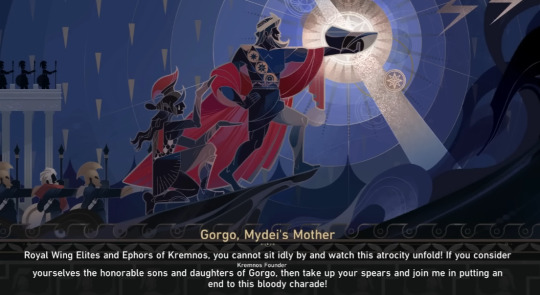
Meanwhile, Aglaea faces the Council of Elders in Okhema, where the decision about the Flame Chase Journey hangs in the balance, waiting on the final vote of a single person to join up with her cause. Just like Gorgo, the alignment of even one person to Aglaea's cause will make proof of her righteousness, prove the she's right. Aglaea lays down the gauntlet, demands the loyalty of her allies--and her leadership and vision are rewarded when Anaxa joins up with the cause, tipping the literal balance of the scales towards the new era Aglaea believes her efforts will bring to fruition.
(In essence, at the end of 3.2, we get to watch Anaxa do exactly what Krateros failed to--stand on the side of the woman who wields justice.)
Ultimately, through they do it through diametrically opposite paths--rejecting and embracing prophecy, respectively--both women are characterized by their drive to create change, their refusal to accept a quiet descent into cruelty and darkness. Both take a stand, outlining their vision for the right way to go on, for a better, softer, brighter world, seeking the loyalty of comrades to legitimize their causes, and--failing that--willing to make the ultimate sacrifice of themselves to further their truly noble causes.
The strength of both women lies not just in their martial prowess, but in their unwavering dedication to a just cause, no matter the cost to themselves.

Generational Influence
What actually started me off on this whole look at Gorgo and Aglaea as thematic parallels was Mydei's scenes with Aglaea, particularly how he clearly considers her a role model for ideal leadership. While I won't go so far as to say Aglaea perceives herself filling any sort of maternal role for Mydei, I think the connection is obvious on Mydei's end: Having never gotten the chance to truly meet his mother, Mydei is almost certainly projecting "the leader my mother would have been" onto Aglaea. (Or perhaps we should say the opposite: The empty spaces in Mydei's mind when he thinks of "Gorgo" are sutured closed with Aglaea's golden filigree.)
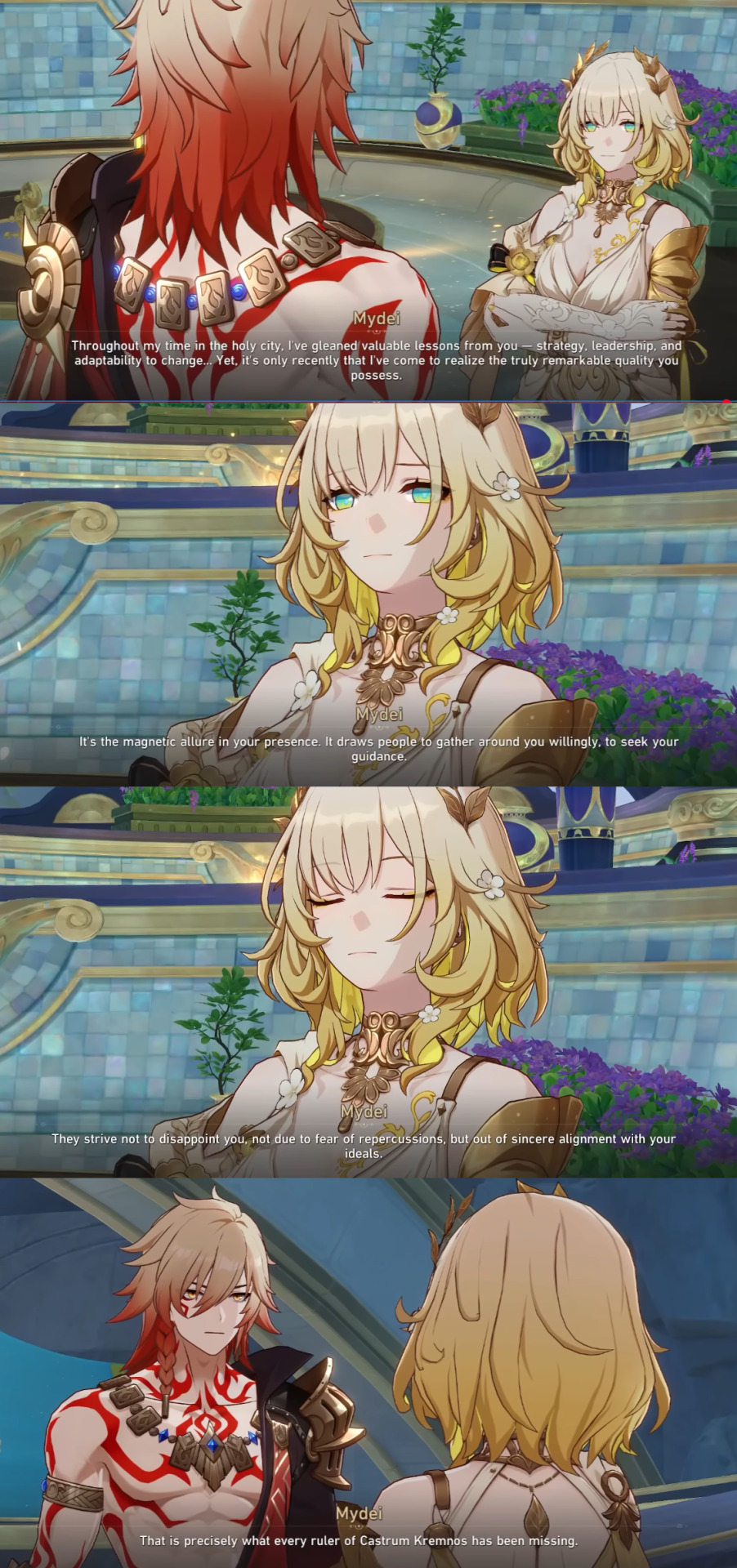
Does this sort of praise sound a bit familiar? It ought to, because this is how Krateros describes Gorgo:

Both women are characterized by their ability to move people's hearts, to inspire hope, and to model ideal strategy for others.
So how could Mydei do anything but link Aglaea's leadership with the life he imagines his mother would have led if she had had the chance to rule Kremnos?
Consider the entire situation from Mydei's perspective: His people have just been (forcibly) rescued from an insane king whose true downfall began with his betrayal of wife, their nation's one genuinely noble leader. If Gorgo had been their ruler, none of this suffering would ever have happened. Fleeing the madness and death Nikador is bringing to Kremnos, the entire surviving host of his people migrate to the "Holy City," the (supposed) last bastion of light and peace and happiness in Amphoreus--which is effectively ruled by a woman so powerful that she knows and sees all.
Seemingly effortlessly, she commands respect and fealty, marshaling her forces to do battle with the might of her own sword, while fighting to maintain the very same values Mydei's mother wanted to bring to her own nation. While being unafraid of bloodshed, she treasures life more than anything else. She's honest, direct, and unflinching, but still, despite everything, kind and dedicated to protecting the world she loves.
Mydei doesn't know his mother but there she is. There's the "queen" that his mother should have had the chance to be. There is the leader that Kremnos needed. There is the powerful woman whose dream for the future could have single-handedly changed the course of fate.
Clearly, for lack of personal experience, the Gorgo in Mydei's mind is less a real person and much more an idealized figure. His only direct knowledge of her comes from one "dream," where she tells him that he's more important than the world to her (undoubtedly leaving Mydei to grapple with the question of whether that is something she truly felt or something he just wishes to be true, by the way). Mydei's only other frame of reference for his mother is Krateros's blind veneration, with Krateros constantly holding Gorgo up as the standard Mydei should meet.

Gorgo is clearly on an achingly high pedestal for Mydei. He shaped his entire youth around the need to avenge her, and then he shaped his entire adult ideology around her vision for Kremnos. In "our" timeline, Gorgo may not have lived to create the change she hoped for, but her goal was ultimately achieved nonetheless, through the inter-generational influence her memory had over Mydei. It was Gorgo's hatred of wasteful bloodshed that helped Mydei to hate it too. It was Gorgo's desire to change Kremnos's traditions that led Mydei to consider tearing down its dynasty. It's his mother's gentle love for her people that echoes in Mydei's same affection.
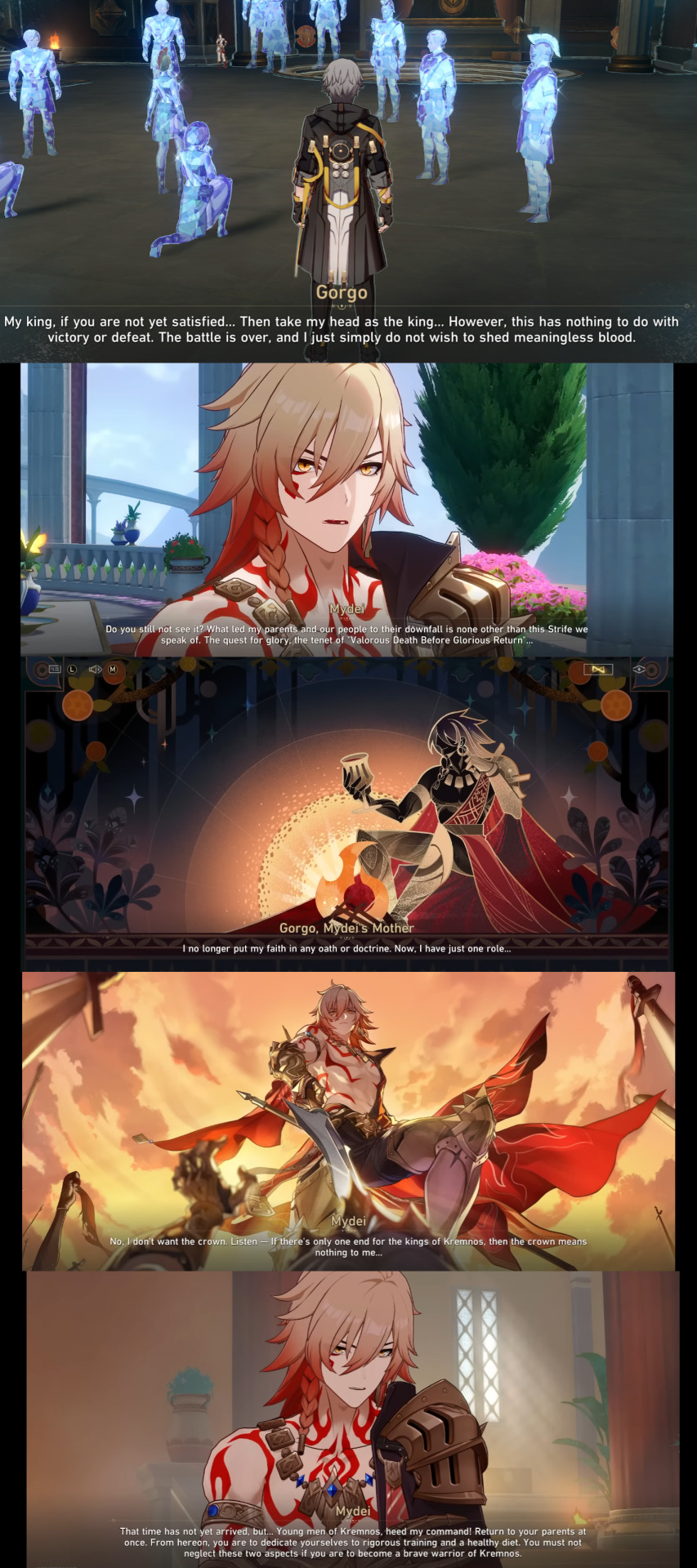
And through Aglaea, all those views and lessons were enforced. Before joining up with the Flame Chase Journey, the game tells us that Mydei's life was effectively still a hellscape even when he had his friends: They wandered the land with nowhere to call home and were attacked by (or themselves attacked) everyone they met, engaging in endless violence just to keep existing, while he watched his companions be brutally murdered one by one. At the risk of extreme understatement: Mydei was not living the life his mother wanted for him.
After joining the Flame Chase Journey, Mydei becomes one of the "heroes" who dedicates himself to protecting innocents and serving as a guardian; he finds a cause, does his best to create a new home for his people, and works to reshape their views towards the beliefs his mother espoused. Like Gorgo putting down her weapon and taking up the role of "just your mother," Mydei gets to (temporarily, briefly) let down his guard and live as just a person, cooking sweets, roleplaying with kids, and cuddling with chimeras.
He inches closer to the dream of finding meaning in finding peace.
And if it was Gorgo who inspired those choices, then it was Aglaea who made them possible--Aglaea who accepted the Kremnoan Detachment into Okhema, Aglaea who literally put aside her fear of Mydei to accept him as a fellow Chrysos Heir, Aglaea who guided him, Aglaea who modeled transformational leadership for him, Aglaea who gave him the final (if forceful) push he needed to commit to changing his people's future, destroying the bloodstained Kremnos of the past. In all his struggles to move forward, the threads of Aglaea and Gorgo's mirrored ideology lead Mydei through the labyrinth of uncertainty.
All things considered, Gorgo might actually be the character with the single most significant impact on Amphoreus's current plot other than the Trailblazer, because the guidance and beliefs she instilled in Mydei will live much longer than Gorgo and even Aglaea herself--may even live on through the end of the world and the rebirth of all of Amphoreus, because it is her exact ideology that becomes the backbone of Mydei's life advice to Castorice. When Castorice reveals their future, telling him the demigods of today's Amphoreus will become the titans of the new cycle, Mydei looks her in the eye and tells her the exact thing he learned from his mother and Aglaea:

Don't accept defeat--defy despair with everything you have and weave the future with your own two hands.
Perhaps nowhere do we see the parallels between Gorgo and Aglaea more clearly than in the "As I've Written" chapter, where we are told that what ultimately swayed Mydei's decision to join the Flame Chase Journey was when, completely without knowing it, Aglaea spoke the exact same words as his mother.
Though the organization of "As I've Written" is often unclear, making it difficult to determine which passages are actually linked to each other and which are entirely separate, I'm going to personally interpret the quote included in Mydei's third chapter as that special sentence once spoken by both Gorgo and Aglaea:
"The lion has its own historian, and the history of the hunt should not be held by the hunter alone."
Putting aside that all of this is completely impossible in the timeline as we know it (Mydei has no way of remembering the sentences his mother might have spoken to him, and none of the sentences in any flashbacks or her letter to him have anything to do with lions or historians), if this is the line echoed by both women, it is an obviously poignant phrase that would immediately signify to Mydei that Aglaea's ideology matches his mother's.
Although the English translation of "As I've Written" leaves A LOT to be desired (sometimes to the point of being entirely incomprehensible; I legitimately have no idea who okayed those translations, rife as they are with just straight up grammar errors lol), the origin of this phrase is unmistakable. It comes from the African proverb that is normally translated as:
"Until the lion has its own historian, the history of the hunt will always glorify the hunter."
Essentially, "History is written by the victors."
If we take the English translation seriously, what Aglaea and Gorgo would have been saying is that "the defeated" (which, by the way, is symbolized by the lion repeatedly in Kremnos's history) should have their own historian, and that no one should get to speak for them. That is, of course, that no one should get to speak for Mydei except himself--that he should take charge of his own destiny and write his own history into the books.
Krateros repeatedly insists that Mydei is the hunter, the one who should be controlling the whole hunting ground:
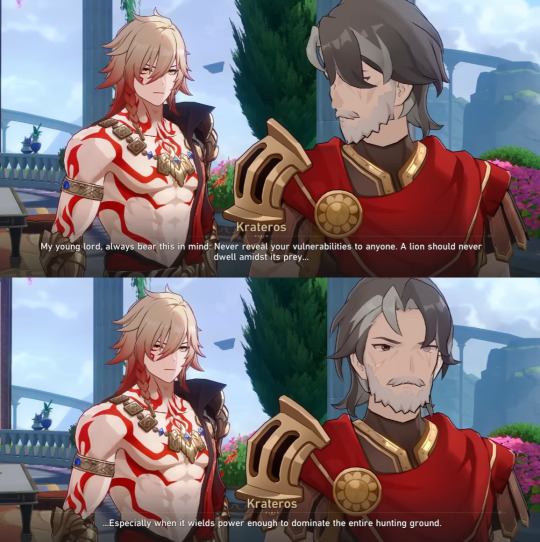
But Aglaea sees through Mydei in the first moment of meeting him--sees that he's not the victor but the victim, not the Kremnoan king-to-be but the "wandering lion" who is at risk of being slaughtered on the altar of Kremnos's glory. Kremnos's history is not the "hunting lion"--it's the lion hunt. Gorgo the founder killed the lion, Gorgo the mother killed the lion... So where does that leave Mydei, the symbolic lion?
This line is saying, Aglaea and Gorgo would both have been saying: I see you. I see that there's an entire unspoken legacy weighing on your shoulders, a horror you're fleeing from like wounded prey, a fierce desire in you to refuse the tale this world is writing for you. And in supposedly echoing Gorgo's words, Aglaea would also have echoed the very core of Gorgo's faith:
Those who have lost everything still deserve the chance to shape their own futures.
Those who have faced impossible odds, those who Fate itself has marked for death, those who would martyr themselves to secure the futures of others can and should still rage against the dying of the light, still fight with every tooth and nail to bring about a different ending.
When no one but (apparently) the ghost of Gorgo in his head had ever said it to him, Aglaea told Mydei:
If you want a different history, you can write it.
Of course he joined the Flame Chase Journey after seeing that its leader carries the very same deep-rooted goodness as his mother.
And while we're here talking about the mirrored ideologies and guidance both women have offered to Mydei, I also want to add a tiny aside about Aglaea's symbolic leadership of the other Kremnoans as well.
Although of course Mydei remains their de facto leader even in Okhema, Mydei himself makes a big deal out of the Kremnoans having submitted to Aglaea's authority, repeating in several places that the Kremnoans have a duty to follow her commands.

This isn't an off-hand statement; for someone who should have already been crowned king to state in his own words that his people should submit to someone else's authority is effectively tantamount to ceding his throne specifically to her--Mydei has essentially handed over the reins of Kremnoan leadership to Aglaea. He's the crown prince, but she's effectively the queen (that his mother never got to be). The promotional materials even label Aglaea and Mydei as occupying the same role ("King"). This is especially clear in how the Kremnoans refer to her. In multiple places, Aglaea is referred to as "the golden-haired usurper."
You don't get called a "usurper" unless people believe you're attempting to undermine their current ruler. In all but flat out saying it, the other Kremnoans perceive Aglaea as usurping Mydei's authority, despite Mydei himself willingly giving that power to her. Mydei isn't careless with the Kremnoans' futures, he doesn't shirk his duties as their crown prince, and he certainly would never surrender his power to a weak, unfit ruler. Undoubtedly, Mydei is comfortable with the idea of ceding authority to Aglaea in part because he recognizes his mother in her, sees the qualities that elevated Gorgo to royalty in Kremnos alive and well in Aglaea's Okhema. In this way, perhaps we could say that another factor contributing to Mydei's hesitance to take up Kremnos's throne might be a subconscious sense that the Kremnoans are already in the right hands, that Aglaea--embodying the ideal leadership Mydei projects onto the memory of his mother--is a better fit than he could ever be to lead them anyway?
Heck, while we're at it, I think it's even interesting that the cities of Okhema and Kremnos mirror each other so much, down to things that honestly don't make sense: We're told the legend explaining the lion heads on the walls in Kremnos, but... why are there are also talking lion heads all over Okhema's walls? Gorgo who tore the head off the Tretos lion is echoed in Aglaea, who rules a kinder, softer city still symbolized by the lion, where the talking lion heads get to be gossips and riddle masters instead of war strategists.

Okay, and the last silly thing I want to say: Aglaea would definitely not call herself a mother figure for Mydei, but after 3.2 reveals Gorgo's tough love methods, Aglaea's attempts at scolding him start to look pretty familiar, from her exasperated chiding to her genuine criticism:
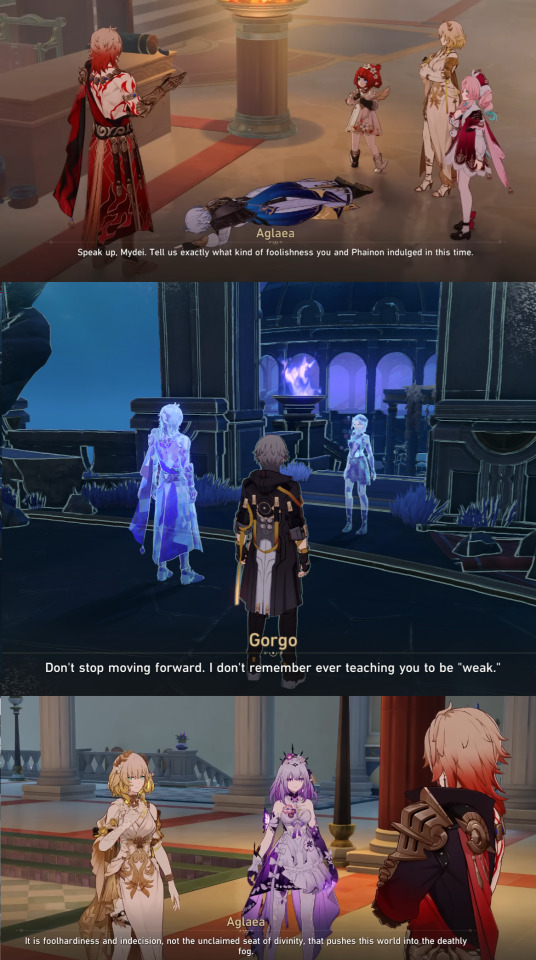
Mydei has it tough, having to meet the expectations of women like these lol.
To Fade from the World
Sorry, that was a bit too light-hearted for me, so time to end this post with some more pain:
A final point I think worth comparing between Gorgo and Aglaea is the ultimate fate that both of them face in the story: Gorgo is already gone, but Aglaea is not far behind.
Gorgo's death in particular is treated as abominable. Kremnoans may be warmongers and Strife worshipers, but they're supposed to be honorable about it. Key to their obsession with combat is the idea of noble combat, between contestants who are each given a fair chance. Despite being Gorgo's greatest ally, Krateros does not stand up and join her in her revolt against Eurypon, likely because of that same "might makes right" mindset that shaped so much of Kremnos's decision-making: If Gorgo's cause was truly righteous, then she should have been able to stand up for it herself and win a duel against Eurypon. If it had been a fair contest as expected by Kremnoan cultural standards, then whoever won would have been considered the "correct" person, and no one could have contested the fair results.
But Eurypon's cowardice drove him completely from the path of Kremnos's sacred virtues, causing him to betray their values by betraying his wife, using poison to deny her her fair chance in the duel. This action--forsaking the core tenets of Nikador's divinity--marks the truest extent of Eurypon's downfall, and cements that he is utterly unfit to rule, lacking both the courage to confront his wife in fair combat and the honor to reject under-handed schemes to ensure victory.
Gorgo's death is treated as a tragedy, an act that entirely shapes the course of the story through Mydei's loss to the sea and his subsequent quest for vengeance. It was cowardly betrayal that took away Kremnos's path to a brighter future, locking the self-fulfilling prophecy of Kremnos's downfall into place.
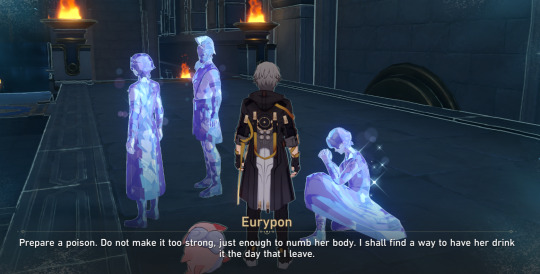
And this, of course, is a perfect mirror to the prophesied end Aglaea is going to face, possibly sooner rather than later. Upon their ascension as demigods, each Chrysos Heir is told how their life will end. Aglaea's prophecy states: "You shall have your final bath in warm and radiant gold."

As Aglaea is most often seen there, the assumption is that she will literally die in the baths--Mydei states this in-game, saying "If a normal person heard that prophecy, they'd probably just stop coming to the baths." Aglaea effectively dismisses this threat (in a very Kremnoan fashion even, lol) by simply saying "Well, who cares? I like baths!" Whatever will be, will be; if her assassin has the strength to end a demigoddess, then truly, it doesn't matter where she goes in Okhema or across the world--fate will find her.
Of course, there's also the possible interpretation that "final bath in gold" refers simply to bathing in her own golden Chrysos Heir blood...
But in either case, the prophecy, Mydei's comments, and some plot leaks I've seen all point towards a violent and unexpected end--likely at the hands of a betrayal.
Like Gorgo, Aglaea will not live to see the world she wished to create, the softer, golden future she wanted to bring to her people. At the hands of her enemies, either facing it with honor or in an unexpected moment of vulnerability, Aglaea will be eliminated before the final hour, fading from Amphoreus's memory as the survivors succeed--or fail--to usher in the new era she sacrificed everything to create.
Although both unique characters on their own, entirely separate from each other, examining Aglaea and Gorgo's parallel plot points, core character traits, and their roles and influences on others throughout the course of the story reveals yet another incredible "echo effect" in Amphoreus's writing, aligning opposites--Okhema and Kremnos, Beauty and Strife--through eerily similar patterns and revealing the enduring thematic threads that bind together the separate portions of Amphoreus's tale.
More than anything, Amphoreus feels to me like a very Hamilton-esque "Who lives, who dies, who tells your story?" plot, one that hinges on the question of who has the power to shape and reshape the future of their world, who has the power to break through a pre-ordained structure and bring about a better end--who has the courage to sacrifice it all to seize the reins of fate itself.
Through Aglaea and Gorgo, the story reinforces a message about women in power, women who perfectly balance violence (the traditional domain of male figures) with love, with beauty, and with righteousness to shake the foundations of their world. In what they value and how they lead, the story mirrors and mirrors again, mise en abyme, the message that those who are willing to give it all for the greater good are the true crafters of our story.
(Perhaps all this is preparing for the presence of another woman, one just as willing or more to do all that must be done to usher in a brighter future for her world?)
The history of the hunt should not be held by the hunter alone.
The lion has its own historian--and so too does the lioness.
Although Gorgo and Aglaea will both fall before that golden Era Nova can be achieved, the marks they have left on Amphoreus's plot, through their legacies of defiance and grace picked up and carried, torch-like, by other characters, demonstrate just how central both women were to all that happened in the world's past and all that will happen in its future.

#honkai star rail#aglaea#gorgo#mydei's mother#amphoreus#character analysis#hsr meta#this is the post I had mentioned starting a while ago#and ended up with a bit of a sour taste in my mouth over the hsr fandom#but then thinking about Aglaea and Gorgo revived my love#so fuck it we ball#two absolute queens#and the story makes a fantastic mirror image#of vastly different characters whose hearts are well aligned#Mydei's relationship with Aglaea is very precious to me#SHE WAS AFRAID OF HIM#and he's just like “I wish my mom was still alive so she could rule our country like you rule yours” T_T#like ma'am#that's your secret self-appointed mentee you had no idea was idolizing you and taking notes on your leadership#I wish we had gotten to see any of this in the game#Mydei's efforts to be more Aglaea-like for his own people lol#I'm also still laughing to myself#over the fact that Krateros clearly worshiped the ground Gorgo walked on#and then is like “AGLAEA IS THE WORST”#Sir???#that's the Okheman version of your grown ass man crush???#“It's Okheman so it's bad by default!!” >:[#I loved writing this post#but holy shit was it cursed#tumblr drafts died on me and lost half the text and half the images like THREE times DDD;
217 notes
·
View notes